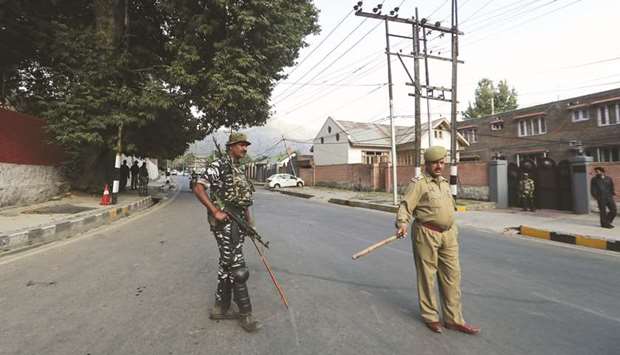The Supreme Court yesterday said the government should restore normal life in Kashmir as soon as possible, as a partial shutdown of the region entered its 42nd day.
The Modi-government stripped Kashmir of autonomy and statehood on August 5, shutting off phone networks and imposing curfew-like restrictions in some areas to dampen discontent.
Thousands of troops were deployed to prevent any backlash.
Some of those curbs have been relaxed, but mobile communications in the Kashmir valley are still largely blocked, and more than a thousand people are likely to still be detained, according to official data.
Schools have opened but there is little attendance with parents worried about safety, with public transport remaining suspended in the region.
“We direct Jammu and Kashmir to make the very best endeavour to make sure normal life returns,” chief justice Ranjan Gogoi said yesterday, after a panel of three judges heard several petitions relating to Kashmir.
“We ask for restoration to be on a selective basis keeping in mind national interest,” the judges added.
The petitions were filed by Kashmir Times newspaper editor Anuradha Bhasin and political analyst Tehseen Poonawalla challenging the lockdown.
Bhasin contended that the crackdown had restricted the media in the state.
During the hearing yesterday, the government’s lawyer, K K Venugopal rebutted the claims, saying news channels and Kashmir-based newspapers were functioning and the government had offered assistance, including by setting up a media centre for reporters.
Day-time restrictions on travel and assembly were now eased in 93 of the 108 police station areas in the Kashmir valley, Venugopal said. He also gave the court an account of hospital services and food supplies in the region.
The court had previously said authorities there needed more time to restore order in Kashmir.
One of the Supreme Court judges, Sharad Arvind Bobde, said the situation in Kashmir was “a terrible state of affairs”.
Separately yesterday, local media reported Farooq Abdullah, a three-time former chief minister of the state, was detained in Srinagar under the Public Safety Act, a special law that allows for detention of up to two years without trial, and has been criticised by rights groups as draconian.
A current member of parliament, 81-year-old Abdullah had so far been under “unofficial” house arrest at his home in Srinagar city since last month.

Policemen stand guard outside the residence of former chief minister of the Jammu and Kashmir, Farooq Abdullah, in Srinagar yesterday.


